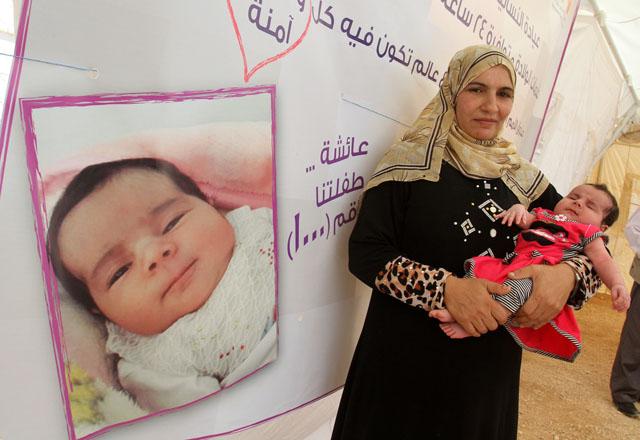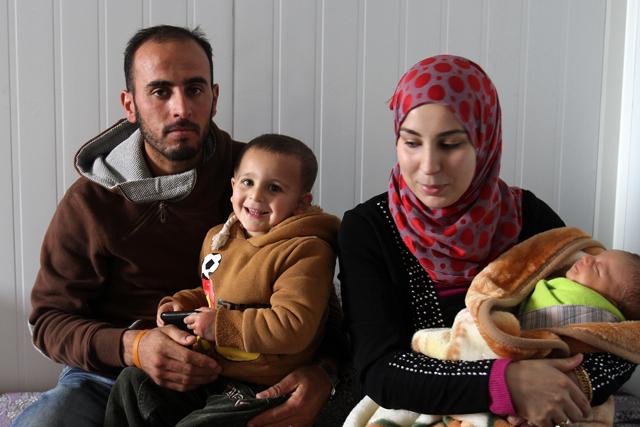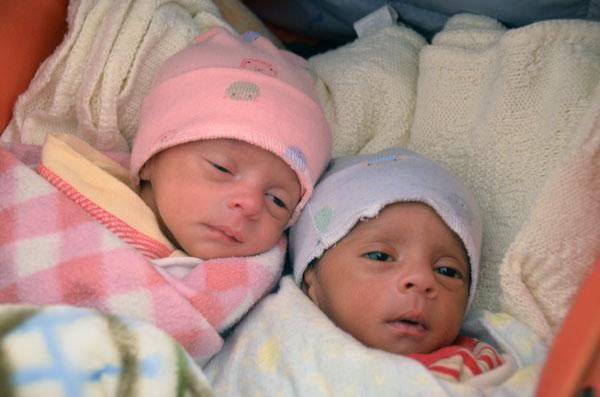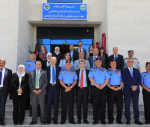You are here
Over 1,000 babies delivered at UNFPA Zaatari camp clinic
By Khetam Malkawi - Jun 23,2014 - Last updated at Jun 23,2014

MAFRAQ — The UNFPA on Monday celebrated the birth of baby number 1,000 at its clinic in the Zaatari Refugee Camp, which currently houses over 85,000 Syrians.
Aisha was born on May 27 in the clinic, which opened a year ago as the only facility that provides normal delivery service for women and is supported by the European Commission Humanitarian Aid and Civil Protection (ECHO).
“I arrived in Jordan when I was eight months pregnant,” Nehad Zubi said, noting that she decided to leave her hometown in Daraa and come to Jordan seeking a safe delivery of her baby.
“With the unrest back home there are no hospitals or clinics that provide delivery services,” the 32-year-old said, adding that there is only a field hospital in Daraa and “they only provide healthcare for the wounded”.
Rabaa Abdel Mawla, a fellow refugee, said she advised Zubi to come and deliver her baby in the Zaatari camp in Mafraq, some 80km northeast of Amman.
“I arrived here one-and-a-half years ago and I am aware of the good services provided at the clinic, which prompted me to advise Nehad to come here,” Abdel Mawla said.
Although Zubi might return to Syria any time soon regardless of the security situation in her town, she told The Jordan Times that she feels “content” now because she had a safe delivery.
Since registering the 1,000th baby in the clinic, another 30 babies have been delivered, according to UNFPA officials.
“Safe delivery” is the agency’s concern, not the number, according to Zeina Horani, UNFPA communications officer.
If a woman needs a caesarian section, she is referred to the Moroccan field hospital, Horani said.
At a press conference held in the camp on Monday, UNFPA Emergency Coordinator Shible Sahbani said each normal vaginal delivery costs the UNFPA and the Jordan Health Aid Society-supported clinic about $100, while a referral to Health Ministry facilities costs $350, which adds to their burden.
He added that UNFPA is more concerned about mothers who are younger than 18 as they need special care.
Since the beginning of the year, 37 of the deliveries involved girls under the age of 18, according to a recent
UNFPA study.
“The health sector, and in particular reproductive health, has always been a priority sector for ECHO,” said Tamara Qaraien, ECHO representative.
She added that 32 per cent of the Syrian refugees in Jordan are girls over 12 years old and this is one of the reasons that ECHO pays special attention to supporting healthcare and reproductive health activities.
Related Articles
Twenty-eight deliveries have been registered among Syrian women at the Zaatari Refugee Camp during the snowstorm, the United Nations Population Fund (UNFPA) said on Saturday.
When Malak Hariri took refuge at the Zaatari Refugee Camp two years ago, she was alone with a baby before her husband followed them.
ZAATARI REFUGEE CAMP — The UNFPA celebrated on Tuesday the safe delivery of 5,000 Syrian babies at the Zaatari Refugee Camp at the UN agency
















